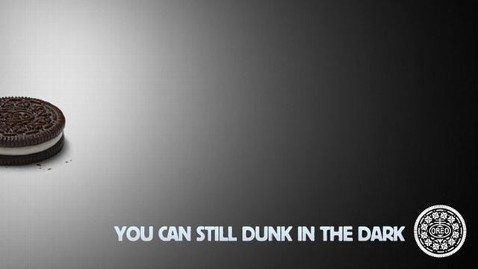The Super Bowl is a perennial showcase of innovative, high-impact, and very expensive television ads. Each year is an exercise to try and outshine previous years, or at least be the most talked about ad of the night. For Super Bowl XLVII, though, the most talked about ad of the night didn’t air on television, and cost next to nothing to produce.
During a mysterious 34-minute power outage at the beginning of the second half of the game, Oreo put out a tweet. It said simply, “Power out? No problem,” and included an image of an oreo in the dark with the caption, “You can still dunk in the dark.” That message was retweeted more than 15,000 times, and “Oreo” was a trending topic on Twitter Monday morning. Oreo also placed the image on its Facebook Page, where its received more than 20,000 “Likes” and has been shared nearly 7,000 times.
The Wall Street Journal says Oreo “culture-jacked” the Super Bowl. “Oreo’s instant Twitter ad stood out on a night when 30-second ads on TV cost $3.8 million. It helped demonstrate the power of ingenuity over money, and social media over traditional forms. It is likely part of a coming wave of real-time advertising that reacts, like a political campaign war room, to real-time events.”
Forbes, however, presented a more sober perspective of the Oreo tweet. “According to Nielsen, an average of 108.7 million people viewed the Super Bowl and 5.3 million people tweeted during it. Even if you assume that another 5.3 million were on Twitter just observing, the total Twitter Super Bowl audience would amount to just 10% of the television audience. In other words, the number of people that might have been exposed to the real time tweets was significant, but just a fraction of those watching on TV.”
But, it’s hard to argue with the “bang for the buck” of the tweet. Granted, at $3.8 million for a TV ad ostensibly watched by nearly 109 million viewers, the televised Oreo Super Bowl ad only cost about 3.5 cents per person. But, aside from whatever Oreo paid the ad agency for the 10 minutes it took them to whip up the tweet, sending out the tweet was free. So, the estimated 10 million people–which grows to around 40 million once you ad the Oreo Facebook Page, and possibly higher once you factor in the extended social networks of those who “Like” the Oreo Facebook Page–cost nothing.
Now, there was more than a little kismet involved. It just so happened that 360i–the Oreo ad team–and the Oreo brand executives were watching the Super Bowl together at the 360i offices. They happened to have the right people, in the right place, at the right time to go from concept, to approval, to a developed ad in minutes. Had they all been watching the Super Bowl from the comfort of their own living rooms, it would have been much more difficult to get the idea approved, and have the right talent available to put the ad together and send it out.
Still, there’s a lesson in there for other businesses. When well-executed, social media marketing can generate significant buzz for a brand with minimal investment. However, in order to execute properly, you must first have taken the time to establish a social media presence and build up an audience to even see the ad. You also have to be willing and able to respond in virtual real-time, and the courage to act in the moment rather than waiting for a committee or focus group to vote on the concept.
I’m not sure how closely Oreo is tracking response, but it would be very interesting to know which ad has a higher response once the dust settles–the $3.8 million TV spot, or the tweet that was essentially free.
- Semperis Confronts the Identity Chaos Exposed by AI Search - December 11, 2025
- The Identity Problem No One Saw Coming—Until AI Exposed It - December 11, 2025
- Cyware’s AI Fabric Pushes Agentic Automation From Concept to Practical Reality - December 8, 2025



